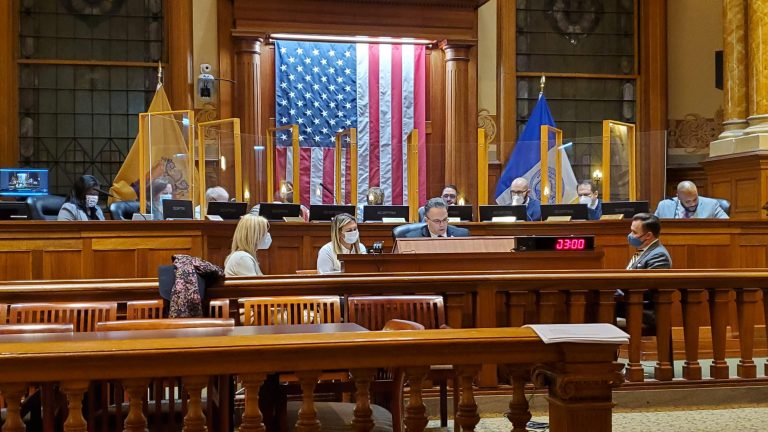
The Jersey City Council has undertaken a variety of legislation, adopting ordinances on a new women’s advisory board and requirements for the cannabis board, and introducing ordinances for council member’s aides and a redevelopment plan.
Women’s advisory board and cannabis board regulations created
The council adopted two ordinances at their Jan. 26 meeting. One will create a city Women’s Advisory Board, and the other wrote new regulations for the city’s Cannabis Control Board. Both were adopted unanimously.
The Women’s Advisory Board will “help women improve the status of women in Jersey City and create awareness of women’s issues within the city,” according to the ordinance, where they will advise the mayor and the council on women’s issues and recommend policy and guidelines.
The board will consist of 11 members appointed by the mayor with the advice and consent of the council, and will consist of a majority of women. “Best efforts” will be made to appoint at least two who are social workers or attorneys. Each term on the board lasts for two years.
“It’s long overdue, but it is the right time because there are so many changes that are happening in the country concerning women,” said Council President Joyce Watterman, the chief sponsor of the ordinance. Watterman is the ctiy’s second female council president in it’s history, as well as the ctiy’s first ever African American woman to have held the position.
“Some days it feels like we have got pushed back instead of moving forward,” she continued. “I believe the Women’s Advisory Board has the potential to serve as a forum for political advocacy, to provide a real opportunity with women organizations, to empower women who do not have agencies to advocate for them, and to recognize and promote accomplishments of women in a community.”
A few public speakers commended the creation of the board, while also noting that it will need to take the right direction to see results.
“Women earned the right to have an advisory board, and we are very happy about that,” said resident Eiko La Boria, who nevertheless said a board with no funding or power to push for change cannot be expected to perform at the highest levels.
“It is our hope that although this is a great step, it is the first step that must move forward the great agenda that is Jersey City women,” she said.
The ordinance that makes amendments to the city’s cannabis board, which reviews and approves cannabis establishments and distribution, will expand the number of board members from three to five.
Three members will be appointed by the mayor with the advice and consent of the council, and two will be appointed directly, one by the mayor and one by the council president. The mayor’s appointees will serve for one year, two will serve for two years, and the last will serve for three years. All appointees by the council president will have a term of three years.
The board will be required to provide a quarterly report on their work, including the number of applicants and locations of any approved facilities, the number of employees and qualifying microbusiness identifiers, and “the percentage of ownership for each beneficial owner, and if applicable intermediary owners, as well as LLC members, partners, public or non-public shareholders displayed in an ownership structure chart.”
The report will also list the proof of residency in New Jersey, as well as the owner’s gender, race, nationality or ethnic group. Lastly, the board must review and approve any applications that were approved by the state within 60 days.
Ordinances introduced
The council introduced a number of ordinances for first reading, with a few of them potentially affecting the council members’ aides and the Morris Canal Redevelopment Plan.
One ordinance would allow council members to hire more aides as well as increase an aide’s salary. According to the ordinance, it would make the city code consistent with state laws and would match the salary ranges in Newark, with Jersey City’s population nearly equal to Newark’s after the 2020 Census. It was introduced unanimously.
Council members would be able to hire up to either four full-time aides or eight part-time aides, and could divide a full-time position into two part-time jobs that will be counted as one for the ordinance’s limit. The aides’ salaries would also increase, from $22,500 to a range of $15,000-$35,000 for part-time aides, and from $45,000 to a range of $50,000-$85,000 for full-time aides.
Another ordinance creates amendments to the contentious Morris Canal Redevelopment Plan, in particular to the Morris Canal Park Manor at 417 Communipaw Ave.
The amendments, if passed, would create a 17-story residential mixed-use building and community center on the former site of Steel Technologies, which would come with a recreational center, incubators for women or minority-owned businesses, and a public plaza.
A number of residents have expressed concerns over how the project would affect the surrounding area. Councilman Frank Gilmore has been critical of it, but the area slated for the manor is set to be taken out of his jurisdiction after the new ward map moved it from Ward F, which he represents, to Ward A.
“I really want to reach back out with the current developer and have further discussion so we can have more clarity on exactly what’s slated to take place,” said Gilmore at the meeting.
June Jones, the president of the Morris Canal Community Development Corporation, asked the council in a statement read by the city clerk to table the ordinance and to give the community a chance to meet with them and the developer.
“Do not enforce this out-of-place project against the will of the people; be courageous, vote your conscience and do what is right by your constituency,” read the statement by Jones.
The ordinance passed the first reading with a 7-2 vote, with Gilmore and Councilman James Solomon voting no.
For updates on this and other stories, follow us on Twitter @hudson_reporter. Mark Koosau can be reached at [email protected] or his Twitter @snivyTsutarja.









